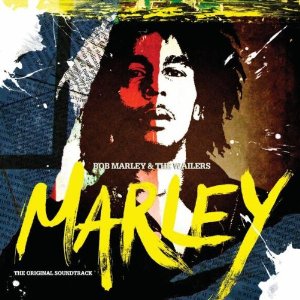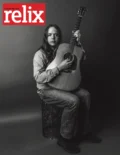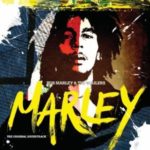
Bob Marley & The Wailers Marley: The Original Soundtrack (UMe)
10 Ft. Ganja Plant 10 Deadly Shots Vol. II (ROIR)
Hand-in-hand with the 4/20 theatrical release of Marley here in the States comes the soundtrack album to director Kevin Macdonald’s documentary on the life of reggae legend Bob Marley.
Strictly speaking, it might be better to treat this double-disc album as a celebration of the Marley documentary, rather than a right-down-the-line track-by-track soundtrack. There are some versions of tunes here that vary from what was used in the movie, such as “Trenchtown Rock” – a studio version plays during the film while the soundtrack album’s “Trenchtown” is from Live At The Roxy. And there are songs used for Marley that didn’t make it onto the soundtrack, which is almost inevitable. The biggest omission is a sweet version of “No Woman, No Cry” a gospel-flavored demo that features the Wailers harmonizing over Peter Tosh’s piano – a cut from a collector’s archives that Macdonald was able to use during the movie, but must not have been available for the soundtrack album. (The classic live version from the 1975 Lyceum show is used here.) “Selassie Is The Chapel” is another tune that is used effectively during Marley (twice, as a matter of fact – including as a backdrop to footage from Bob’s funeral) but didn’t make the album.
These are facts, but not criticisms: the truth of the matter is Marley provides a nice overview of the man’s career and avoids being a simple rehash of the Legend or Natural Mystic hits albums. Here we go back to some early Marley music with “Judge Not” (Bob’s first solo recording, cut back in ’62) and the Wailers’ “Cornerstone” – written about Bob’s shunning by his father’s family and employed brilliantly by director Macdonald. On the other end of the spectrum are examples of Bob’s music reinterpreted since his passing: Paul “Groucho” Smykle’s remix of “Crazy Baldheads” is playful without diminishing the song’s message; the dub mix of “Exodus” spreads things out, providing vast, spacious plains between explosions of rhythm.
Completists rejoice (or pound your heads against the wall; I’m not sure how it works for you): the unreleased nugget here is the historic performance of “Jamming” from the 4/22/78 One Love Peace Concert. While the sound quality is less than perfect, the trade-off is having an audio time capsule of the moment when Bob Marley called Jamaica’s opposing party leaders to the stage and had them join hands. Did that one act change the world? No – but it gave hope … and still does. And nothing can happen without hope.
Overall, the Marley soundtrack makes for a fine addition to the veteran Wailer fan’s collection and a good starting point for the curious rookie. One could debate the inclusion of certain tracks or the exclusion of others endlessly. In the end, it’s a good collection of music.
There are multiple repercussions to the release of the Marley documentary. The obvious is to inspire the uninitiated to dig into the catalog of music, of course; along with that should come explorations of vintage reggae and ska in general; and then there’s the question of who the true modern-day torch bearers are when it comes to the roots reggae genre.
One shoe-in for that last category would be 10 Ft. Ganja Plant, who have just released an all-instrumental effort titled 10 Deadly Shots Vol. II. 10 Ft. Ganja’s releases are always like newly-unearthed recordings that have been buried in the foothills of Jamaica’s Blue Mountains for 40 years or so. The truth is, the band is actually a right-now collective of musicians who deal with their craving for roots reggae by creating more.
One aspect of 10 Ft. Ganja Plant’s history has always been their tendency to avoid in-depth band bios – or even basic album credits. In its way, this is part of the same vibe that their music is saturated with: start digging into the history of roots players such as The Upsetters, The Aggrovators, or The Revolutionaries and you’ll see what I mean. Lineups shuffled from recording to recording; and often who-did-what was never documented for posterity … the only sure thing was that the music was good. Was any of it a secret? No – it just wasn’t crucial to the making of the music … a novelty in this day and age of egos and PR campaigns run amok. With a little effort, some of 10 Ft. Ganja Plant’s roots can be easily traced back to John’s Brown Body, for instance – but in the end, what does it matter if they’re players from Kingston or Buffalo? They’re not worried about it; you shouldn’t be, either. Crank up the tunes.
One thing 10 Ft. Ganja Plant does like to do is thank their special guests who contribute to their efforts. 10 Deadly Shots Vol. II ’s MVP is killer keyboardist Roger Rivas, who is all over this thing with juicy hunks of Hammond B-3 and vintage Farfisa cheese. His tone nestles into the Ganja Plant’s vibe nicely, whether he’s tossing out little flurries and chitters of notes or sounding like he’s got all fours on the keys, laying down massive, roaring chords.
The backbone of any album in 10 Ft. Ganja’s catalog is the big bass/drum sound – a function of mass rather than volume, sounding as if it was being played through a cloud of Black Ark air before being put to tape. 10 Deadly Shots Vol. II is no exception: big, walloping bass bubbles bawoomp up, around, and in between the percussion grooves, leaving the keys and guitars to roam as they may.
Discussing the individual tracks almost defeats the album’s purpose: there’s no need to hunt and pick here, as the whole is a nice place to burrow into. Sure, there’s the minor-flavored curry of “Funeral Of The Master” (which always makes its way back to a major-chorded resolution at the end of each verse); the loose-limbed, sunny-day smile of “Asking Hand”; the tension of “Red Boat Operator”; the cool Tosh-tease guitar of “Death Waiver”; the ska romp of “Fist of Yuen Kay-San”. In the end, though, it’s the album that grabs ahold of you – the result of three days’ worth of players with a mutual jones for this kind of music looking each other in the eye and going for it.
2010’s 10 Deadly Shots Vol. I saw the sax leading the way and this chapter of the series features Riva’s keyboard work. What’s up for Vol. III ?
Jah only knows.
In the meantime, enjoy the Ganja.




No Comments comments associated with this post